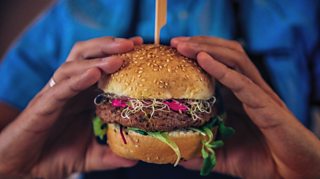Are plant-based sausages and burgers healthier than the real thing?
No summer barbecue is complete without a burger and a sausage or two. Listener Graham is a big fan of a sausage but after hearing health warnings surrounding red and processed meat, he's been on the hunt for a good meat-free alternative.
However, after spotting salt, additives and flavourings in their ingredients – and realising they are often heavily processed – he's wondering if plant-based products really are the healthier choice and reached out to BBC Radio 4's Sliced Bread for assistance.
With the help of experts, Greg Foot investigates the plant-based meat alternatives on the market and identifies what Graham should consider before deciding whether to swap his beloved pork sausage for a plant-based banger…

Processed meats have been linked to numerous health conditions
Processed meats like sausages contain considerable amounts of saturated fat, salt and additives, and there has been a lot of research linking their consumption with a number of different health conditions.
“Too much sodium increases your blood pressure and then this eventually links with problems like cardiovascular diseases,” explains Doctor Sarah Nájera, a research fellow at the London School of Hygiene and Tropical Medicine. “Eating too much [processed meat] is also linked with other types of diseases like cancers, type 2 diabetes and obesity.”
For this reason, the dietary recommendation in the UK is to eat no more than 70g of red and processed meat on average a day.
Plant-based meat alternatives are made from a range of plant proteins
“They are made of soy or pea, or cereals and grains like wheat,” says Sarah, who has just published a large review on the topic of plant-based foods. There is also Quorn, made from fermenting a fungus called Fusarium venenatum to produce a filamentous meat-like product called mycoprotein. (Mycoprotein products are not technically plant-based, but are commonly categorised as such.)
Alan Javier Hernandez Alvarez, a biochemist from the University of Leeds, heads the National Alternative Protein Innovation Centre and is an expert in how meat-free products are created. He explains how the first step is to grind down the seeds or plant material, then process them to extract the protein. Next, a process called extrusion is used to produce ‘texturised vegetable proteins’ that are then mixed with flavours, additives and gelling agents to create the final product.
Plant-based products are generally the more expensive option
Comparing products across the supermarket shelves shows that, gram for gram, the cheapest plant-based burgers can sometimes be cheaper than meat burgers. But generally, plant-based burgers are the more expensive option.

Beef burgers and pork sausages have almost no fibre but the plant-based meats are loaded with it.
With sausages, the plant-based options are a bit pricier than the cheapest pork bangers, although some products like Quorn come pretty close. The ones made of pea, wheat or rice proteins seem to be slightly more expensive than the ones made of soya.
The cost of plant-based meat alternatives is largely down to the additional processing required, explains Alan: “We are using protein concentrates and protein isolates that need to be further processed, and that increases the final cost of the product.” Also, Alan says that “most of these plant-based meats are not produced in the UK and need to be shipped in – which adds to the cost.”
Plant-based options are packed full of fibre
Greg’s team compared the nutritional value of meat and plant-based burgers and sausages and found that, in general, the plant-based options had lower calories by weight than meat, especially soya products. Salt levels were very similar across the board, about 1g per 100g and all products were low in sugar.
But fibre is where the plant-based meats really stand out. Beef burgers and pork sausages have almost no fibre but the plant-based meats are loaded with it. The British Heart Foundation say higher intakes of dietary fibre are associated with a lower risk of heart disease, type 2 diabetes and some cancers.
Sarah’s review had similar findings. “The fibre content was the best part out of what we found about the plant-based products,” she says.
The fat content in plant-based options can sometimes be higher than in actual meat
Plant-based meat alternatives often contain less fat, specifically less saturated fat. However, with burgers the fat content in some of the plant-based options is comparable to meat. In trying to recreate the texture and flavour of meat, manufacturers sometimes use oils like coconut oil, which are high in saturated fat.
This is where the plant-based food industry needs to see improvement, suggests Alan. “Potentially some of the fat replacers that we are using might not be the healthiest,” he states. “We need to come up with novel solutions and healthier solutions.”
Find out more about Greg's investigation into the health implications of cooking oils here.
Some plant-based products are 'ultra-processed' – but that might not be as bad as it sounds
We know processed meats aren’t good for us, but what about plant-based alternatives that are also heavily processed? Ultra-processed foods (UPFs) are products where there is very little unprocessed whole food in them; plant-based meat alternatives do fall into this category. However, many provide more fibre and nutritional value (like vitamins and minerals) and lower sodium than a standard UPF, Sarah argues.
There are a few short-term studies looking at the health impacts of plant-based meat alternatives, and the evidence has been “quite positive” for the plant-based products, says Sarah. Eating them has been linked with better weight maintenance, improved muscle synthesis and good gut health compared to meat. “There hasn't been any evidence showing anything negative yet,” says Sarah.
Plant-based products may be a healthier option, but it depends how much you eat
Sarah believes that plant-based products do present a healthier option. It depends what quantities we eat, but the same is true for processed meat. “I think they are definitely a really good alternative,” she says.
Alan agrees: “I think that there is still a lot of work to do in terms of having healthier products, reducing salt content, sugar and fat. But they are better options, not just for the planet but also for human health.”
To hear Greg's meat-free sausage taste test, and learn more about the green credentials of plant-based products, listen to the full episode of Sliced Bread here.
The information contained in this article was correct at the time of broadcast on 24 April, 2025.
More articles from Sliced Bread
-
![]()
Do any of these jet lag remedies actually work?
Do products promising to ease jet lag live up to the marketing hype?
-
![]()
Can you insulate your home for less than £100?
Can these DIY insulation hacks really save us energy and money?
-
![]()
Which pots and pans are best for your kitchen?
What material is best? And is non-stick coating really safe to use?
-
![]()
Do hair loss treatments actually work?
Do lotions and pills designed to help hair loss in men and women really work?





